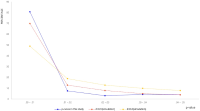PURPOSE This study aimed to identify and establish ESG activity assessment factors tailored for sports brands, offering a foundational framework for fostering sustainability within the sports industry. METHODS A Delphi survey was conducted between December 1, 2022, and January 31, 2023, involving university professors, sports brand executives, ESG researchers, sports marketing majors , a nd sports brand influencers. Data were analyzed using SPSS WIN 24.0 and MS Excel, encompassing research subject classification, consistency verification, and empirical analysis. RESULTS The assessment of ESG activity evaluation factors of sports brands revealed that governance, social, and environmental dimensions ranked in descending order of relative importance. Among specific evaluation criteria, the adoption of employee ethics regulations was deemed paramount in the governance evaluation area, while support for stakeholder welfare and social well-being took precedence in the social evaluation category. In the environmental sector, the production and delivery of eco-friendly, durable products held the highest significance. Further analysis, considering the weighted priorities of all evaluation factors, emphasized the importance of factors, such as the adoption of employee ethics regulations, support for stakeholder welfare, social well-being, and the production and delivery of eco-friendly, durable products. Conversely, disclosure of company information and issues, support for the underprivileged, and general shareholders' meeting or agenda for the protection of shareholders' rights and interests ranked lower. CONCLUSIONS In summary, this study validates the role of governance (G) aspects within ESG activities for sports brands, alongside environmental and social dimensions. It highlights the importance of a balanced ESG framework, particularly in an era marked by heightened social responsibility awareness among consumers. Prioritizing governance in marketing strategies not only distinguishes sports brands but also necessitates impactful promotion and advertising efforts.
PURPOSE This study examined whether K-league fans’ responses to game outcomes align with reference-dependent preference and loss aversion principles. METHODS We collected user comments from the 2023 K-league game highlights videos on YouTube. We identified each user’s supporting team and excluded neutral fans’ comments. Sentiment analysis using KoBERT was applied, and estimated sentiment scores served as dependent variables. We performed panel regression to test whether unexpected wins and losses generate positive and negative comments. RESULTS First, an unexpected win generates more positive comments, and an unexpected loss generates more negative comments; a reference-dependent preference exists. Second, the difference between the coefficient on upset win and the absolute value of the coefficient on upset loss is not statistically different; loss aversion does not exist. CONCLUSIONS The findings derive a deeper understanding of sports viewership and explain the difference between domestic and overseas sports fans. Also, the findings provide insights into the domestic professional sports business.

Purpose This study was aimed at laying out criticism regarding statistical hypothesis testing and presenting realistic alternatives focused on published studies of sports management in Korea. Methods Among 202 studies compiled by the Korean Society for Sport Management, vol. 19, no. 1 through vol. 23, no. 6, 115 studies which used the null hypothesis significant testing were finally selected. After data coding for selected studies, p-curve, the distribution of p-values which reported in individual studies, was schematized, and than adequacy about the sampling method and result descriptions were analyzed. Results The ratio of p-values close to zero was relatively very high in p-curve although there was no clear evidence of p-hacking. Also, approximately 82% of the studies used convenience sampling method, and incorrect descriptions in part of result and discussion due to lack of understanding of statistical hypothesis testing was found in some studies. In conclusion, the shortcomings of statistical hypothesis testing which commonly used in academic field were depended on not a defect in the method itself but researchers who misused statistical hypothesis testing. Conclusions Researchers in sport management field need to understand the advantages and disadvantages of statistical hypothesis testing and consider to use both confidence interval and effect sizes to compensate the disadvantages of p-value.

Purpose There is a growing number of potential demand on experiential horse riding tourism due to the expand of tourism and sports industries, however the experiential horse riding clubs are operating inefficiently. Therefore the purpose of this study is to investigate implicity importance of horse riding club’s selection attributes and analyze factors affecting positive effect on market share thereby find the way to improve operating system. Methods The survey was done among 258 horse riding tourism customers of Jeju, Gyeonggi, and Gyeongbuk provinces, and conjoint analysis to figure out the relative importance of selection attributes, and simulation to predict the market share of experiential horse riding were conducted. Results The results are as follows. Cost was the most important factor when selecting horse riding club and program, location, staff were followed by. Also, “The club that serves various activities with horse riding program at 10,000won where the condition of road and parking lot are good” had the best market share. Conclusion This study suggested the effective and efficient manners to operate the horse riding club and the political implication.